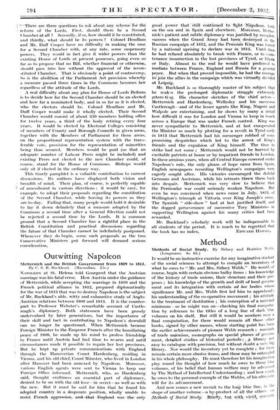Outwitting Napoleon
Metternich and the British Government from 1809 to 1813. By C. S. B. Buckland. (Macmillan. 25s.)
NAPOLEON at St. Helena told Gourgaud that the Austrian marriage was his fatal error. How Austria under the guidance of Metternich, while accepting the marriage in 1810 and the French political alliance in 1812, prepared diplomatically for the war of 1813 that was to destroy Napoleon is the subject of Mr. Buckland's able, witty and exhaustive study of Anglo- Austrian relations between 1809 and 1813. It is the counter- part to Professor Webster's remarkable account of Castle- reagh's diplomacy. Both statesmen have been grossly undervalued by later generations, but the importance of their skill and tact in contributing to Napoleon's downfall can no longer be questioned. When Metternich became Foreign Minister to the Emperor Francis after the humiliating peace of 1809, he made up his mind to profess friendship to France until Austria had had time to re-arm and until circumstances made it possible to regain her lost provinces. But he kept 'up private communications with England through the Hanoverian Count Hardenberg, residing in Vienna, and his old chief, Count Miinster, who lived in London after Hanover had been annexed by Napoleon. Moreover, various English agents were sent to Vienna to keep our Foreign Office informed. Metternich, who, as Hardenberg said, thought craftiness an essential part of diplomacy, desired to be on with the old love=in secret—as well as with the new. But it must be said for him that he found his adopted country in a desperate position, wholly unable to resist French aggression; --aral--4>kat- England- was- the-- -only great. power- that still Continued to -fight -.Napoleon, both on the sea and in Spain and else-where. Moreover, Metter- nich's patient and subtle diplomacy was justified by complete success when the Grand Army" had been destroyed in the Russian campaign of 1812, and the Prussign King was fork by a national uprising to declare war in 1813. Until then he had refused absolutely to break with France, or to eoum. tenanee insurrection in the lost provinces of Tyrol, or Illyris or Italy. Almost to the -end" he would have preferred to - Mediate between France, England and Russia for a general peace. - But when that proved impossible, he had the courage Mikan the allies in the campaign which was virtually decided
at Leipzig. •
Mr. Buckland is so thoroughly master of his subject that he malcs the prolonged diplomatic struggle extremely intere: ti ig. His character sketches of the chief actors- Metternich and Hardenberg, Wellesley and his successor Castlereagh—and of the lesser agents like King, Nugent and Walpole are entertaining, and he shows by many a detail how difficult it was for London and Vienna to keep in touch across a Europe that was under French control. King was never sympathetic to Metternich, and at last exasperated the Minister so much by plotting for a revolt in Tyrol early in 1813 that Metternich had his messenger robbed of com- promising despatches which led to the arrest of King's friends and the expulsion of King himself. The time to strike had not come ; Metternich would not be hurried by excitable patriots at home or by impatient friends in London. In these anxious years, when all Central Europe cowered under Napoleon's rule, the only gleam of hope came from Spain. English newspapers recording Wellington's campaigns were eagerly sought after. His victories encouraged the doleful Germans and Austrians, While his retreats threw them back into despair. Metternich was very slow to believe that the Peninsular war could seriously weaken Napoleon. But even he was convinced when news came in July, 1813, of Wellington's triumph at Vittoria over King Joseph's army. The Spanish " side-show " had at last justified itself, and the dogged perseverance of successive Tory Ministries in supporting Wellington against his many critics had been rewarded.
Mr. Buckland's scholarly work will be indispensable to all students of the period. It is much to be regretted that










































 Previous page
Previous page